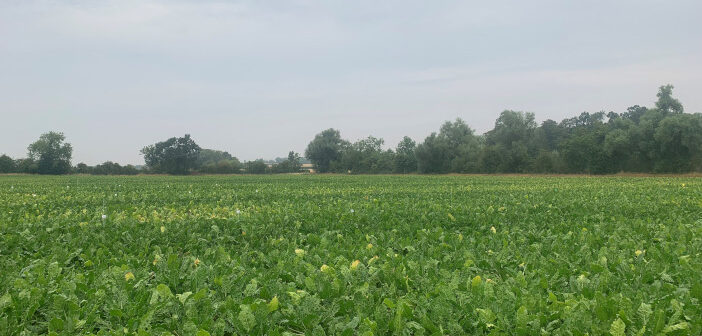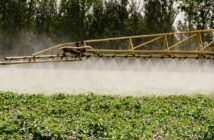A 2022 sugar beet trial carried out by an independent research body has shown plants treated with supplementary silicon are able to resist aphids more effectively than untreated plants. The trial also demonstrated a reduction in virus transmission and a decrease in the number of virus affected plants when Sirius, a silicon biostimulant, was applied in addition to common aphicides.
“The trial tank-mixed Sirius with two standard insecticides, Insyst applied at 0.25kg/ha and Teppeki applied at 0.14kg/ha. Both treatments showed a reduction in virus transmission when silicon was added to the tank. Following one application, both treatments also showed no, or very low numbers, of wingless green aphids per plot,” explains Orion FT technical manager Kate Williams.
Orion FT specialises in biostimulants and manufactures a range of silicon-based products that help to improve the natural defences of plants. The sugar beet trial findings are reinforced by data from a previous trial which showed silicon accumulation in pea plants also reduced aphid feeding and lowered population numbers.
 “Sugar beet plants, and many other crops, are essentially stronger when more silicon is accumulated. The increased levels of silicon also make the plant less attractive to pests, such as aphids, which reduces feeding and the likelihood of viruses being transmitted. Combining Sirius with aphicides in this way has provided the most encouraging sugar beet protection results to date,” she adds.
“Sugar beet plants, and many other crops, are essentially stronger when more silicon is accumulated. The increased levels of silicon also make the plant less attractive to pests, such as aphids, which reduces feeding and the likelihood of viruses being transmitted. Combining Sirius with aphicides in this way has provided the most encouraging sugar beet protection results to date,” she adds.
Silicon is applied as a foliar spray to sugar beet at growth stage 6-8 true leaves, and once accumulated, acts to reduce the feeding time of predating pests such as aphids. This reduction in feeding time has been identified as an important factor in the reduction in virus transmission and has also led to healthier plants with an improved yield.
“It is clear that helping sugar beet plants to accumulate more silicon by applying Sirius will help to reduce the threat of pests and disease. The data we have gathered from multiple sources, field application, replicated plot trials and lab studies has demonstrated not only why a silicon treated crop is more resilient, but also how increasing silicon levels in the plant can have a positive impact on quality and yield,” she concludes.


 “Sugar beet plants, and many other crops, are essentially stronger when more silicon is accumulated. The increased levels of silicon also make the plant less attractive to pests, such as aphids, which reduces feeding and the likelihood of viruses being transmitted. Combining Sirius with aphicides in this way has provided the most encouraging sugar beet protection results to date,” she adds.
“Sugar beet plants, and many other crops, are essentially stronger when more silicon is accumulated. The increased levels of silicon also make the plant less attractive to pests, such as aphids, which reduces feeding and the likelihood of viruses being transmitted. Combining Sirius with aphicides in this way has provided the most encouraging sugar beet protection results to date,” she adds.

